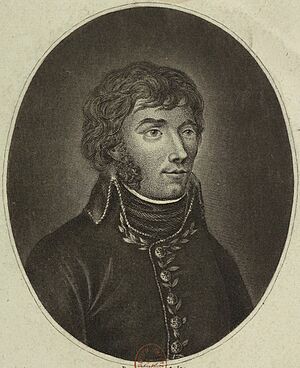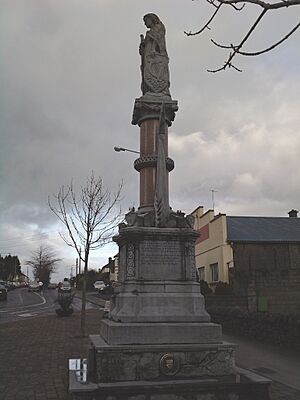Jean Joseph Amable Humbert facts for kids
Jean Joseph Amable Humbert (born August 22, 1767 – died January 3, 1823) was a French military officer. He took part in several important wars in the late 1700s and early 1800s. Humbert was born in a small town called La Coâre, near Remiremont in France. He started his military career as a sergeant in the National Guard in Lyon.
Humbert quickly rose through the ranks. By April 9, 1794, he became a brigadier general. He fought in various campaigns during the French Revolutionary Wars. He also played a role in the Irish Rebellion of 1798 and the War of 1812.
Humbert's Expeditions to Ireland
In 1794, General Humbert served in the French army. He worked under General Lazare Hoche. Humbert was given the job of preparing for a trip to Ireland. This trip was meant to help Irish rebels. He took charge of a group called the Légion Noire.
In 1796, Humbert sailed with a French fleet towards Ireland. This trip was called the Expédition d'Irlande. However, bad weather and fights with the British Navy forced them to turn back. On the way home, his ship, the Droits de l'Homme, sank. Hundreds of men died, but Humbert was one of the last to escape.
After returning to France, Humbert was chosen to lead French troops to support the Irish Rebellion of 1798. His small army was mostly infantry soldiers. By the time he reached the Irish coast, the rebellion had mostly been put down by the British.
-
-
- Landing in Ireland and Early Successes
-
Humbert's forces managed to land in Killala, Ireland, on August 23, 1798. They had some early success. They won the Battle of Castlebar, defeating the Irish Militia. After this victory, Humbert announced the creation of an Irish Republic. He then began marching towards Dublin, the capital city.
However, Humbert's small army was eventually defeated. They lost the Battle of Ballinamuck to the British Army. Humbert was captured and became a prisoner of war. He and his French soldiers were later exchanged for British prisoners. Humbert asked the British to treat his Irish officers well. He was sad when some of them were executed because they had been British subjects before joining his forces.
Later Military Service
After being exchanged, Humbert returned to France. He served in several French armies. He fought in the Second Battle of Zurich. Later, he went on an expedition to Saint-Domingue (now Haiti). The goal was to bring the colony back under French rule.
In October 1802, Humbert was sent back to France. He was a strong supporter of the French Republic. He did not like Napoleon's plans to become emperor. Because of his views, he was dismissed from the army in 1803. He then retired to a region in France called Morbihan.
-
-
- Life in America and the War of 1812
-
In 1810, Humbert moved to New Orleans in the United States. There, he became friends with a French pirate named Jean Lafitte. In 1813, Humbert joined a revolutionary leader in an attempt to start a rebellion in New Spain (parts of modern-day Mexico). This attempt was not successful.
In 1814, Humbert left New Orleans again. He joined the fight for independence in Argentina. He briefly led a group of soldiers there before returning home. A year later, Humbert joined the U.S. Army as a private soldier. He fought in the Battle of New Orleans during the War of 1812. He even wore his old French uniform during the battle.
General Andrew Jackson thanked Humbert for his help after the American victory in January 1815. After the war, Humbert lived a peaceful life. He worked as a schoolteacher until he passed away.
Commemoration
In 1989, a sculptor named Carmel Gallagher created a statue of General Humbert. This statue was placed in Killala, Ireland. It was unveiled to mark 200 years since the 1798 Rebellion.
 | Aaron Henry |
 | T. R. M. Howard |
 | Jesse Jackson |



